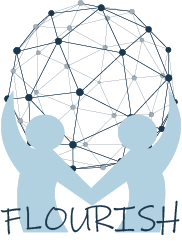


FLOURISH
Design of participatory intergenerational learning for social cohesion

Project period: December 2021 – November 2023
Target group:
– adult educators and social workers
– Young people, seniors
Coordinator: Pistes-Solidaires (France)
Partners of the project: AIS (Austria), Exeo Lab (Italy), Innovation Hive (Greece), Synthesis (Cyprus)
Website: Flourish-centers.eu

The context
Although there are many definitions of “senior” (age of retirement, onset of frailty, loss of autonomy), the age is above all psychological: 80 is the age at which most people over 65 accept to consider themselves as “old”.
On the other hand, the preconceived ideas conveyed about seniors, and sometimes by seniors themselves, can lead them to self-censorship (“it’s not my age”, “it’s too late for me”) or to a lack of self-confidence that is sometimes totally unrelated to their level of skills, and this can apply to most areas of daily life, including digital. According to the Good Things Foundation, advanced age “remains the strongest predictor of not using the internet, particularly among people over 75, those living alone and those who need help”. Reasons may include lack of confidence in oneself and one’s abilities, mistrust, concerns about online safety or encountering a problem, fear, changes in one’s dexterity or cognition leading to a desire to take a step back, or difficulty in “keeping up” with technology.
In 2019, only 7% of digital users were over 65 years old compared to 18% aged 18-25 and 34% aged 25-34.
A study conducted at the start of the pandemic by Age UK found that 39% of people aged 52 and over admitted to using the internet more since the start of the pandemic. However, it was found that the most common barrier to internet use for the 75+ age group was a lack of digital skills.
This lack of digital competence has also resulted in socially excluding and marginalizing the elderly as the potential or opportunity for interaction across generations lacks or is limited: the world as they know it, namely culture, education, healthcare and even communication, is continually moving to the digital space. A place they struggle to find their way to.
The objectives
FLOURISH is a project that aims to empower older adults, particularly disadvantaged older adults, who face social exclusion due to many factors, one of which is their limited participation in digital space. Through carefully planned intergenerational activities, adults from marginalized groups will interact with young people, building relationships between generations while developing their digital capacity through interactions and activities around cultural heritage.
It is important to note that, as in all intergenerational learning interactions, learning is not one-sided. While older adults will acquire digital skills from their younger counterparts, the younger generation will gain first-hand knowledge and experience in cultural heritage work and practices.
The results
Flourish has had three significant outputs. The first is the “FLOURISHING”: Online Learning Platform, that is meant to train adult educators on intergenerational learning, and to support both senior adults and young adults in creating cultural heritage products by providing them with relevant tools.
The second output is a Good Practices guide for adult educators who will implement intergenerational workshops for target groups to collaborate on a cultural heritage activity.
Finally, the third output is the LIVE Exhibition, a virtual space that will be an empowering, next generation inclusive community exhibition space to share the products and creative outputs that resulted from the intergenerational workshops discussed in the Best Practices guide.


